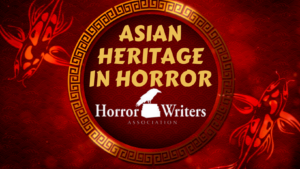Asian Heritage in Horror: Interview with Maria Dong


Maria Dong is the author of Liar, Dreamer, Thief. Her short fiction, articles, and poetry have been published in dozens of magazines, like the Best American Science Fiction and Fantasy, Lightspeed, Augur, Nightmare, Khoreo, Fantasy, Apex, and Apparition Literary Magazine. She is represented by Amy Bishop at Dystel, Goderich & Bourret.
What inspired you to start writing?
I was in a car accident about ten years ago, and while I was recovering I was in a house that did not have internet or cable. And I was really bored, and I was bed-bound, so I started writing stories to entertain myself, and I found that I really enjoyed it.
What was it about the horror genre that drew you to it?
I have always loved horror, even when I was in middle school I was reading a lot of Stephen King. I think horror can tell us the most about human nature, because it is so deeply psychological, and it is also political, and that is something that I really enjoy exploring.
Do you make a conscious effort to include Korean characters and themes in your writing and if so, what do you want to portray?
Absolutely! Growing up, I saw very little Korean representation, and the majority of what I did see surrounded the Korean War. I try to portray a diversity of experiences instead of just the stereotypes. For example, the main character of my recent novel deals with mental illness, and struggles with poverty, which are two perspectives not often shown in the Asian American experience.
What has writing horror taught you about the world and yourself?
I think one thing that it has taught me about the world is that everyone is afraid of different things, and that has a lot to do with the circumstances in your life, whether that is racial, gender, or financial marginalization. People who have access to power are often more afraid of losing that power than they are of losing their autonomy, self-expression, and connection to their community.
How have you seen the horror genre change over the years? And how do you think it will continue to evolve?
I think that I have definitely seen more publicity given to authors of marginalized identities and horror has been more willing to engage with those lived experiences, and I think that is going to continue to occur.
How do you feel the Korean community has been represented thus far in the genre and what hopes do you have for representation in the genre going forward?
I think the majority of Korean horror is specifically horror from Korea, in other words, works in translation, which is often viewed through an exoticized lens. I am hoping to see more mixed-race experiences and more second-generation, Korean-American experiences.
What is one piece of advice you would give horror authors today?
If it’s to marginalized authors, I would say that remembering that the things that scare you are not necessarily the truth for other authors, so you might experience more rejection than people who are writing things that are more traditionally mainstream, and you have to make your peace with that. Figure out what you mean, what you really want to say, and say it.



